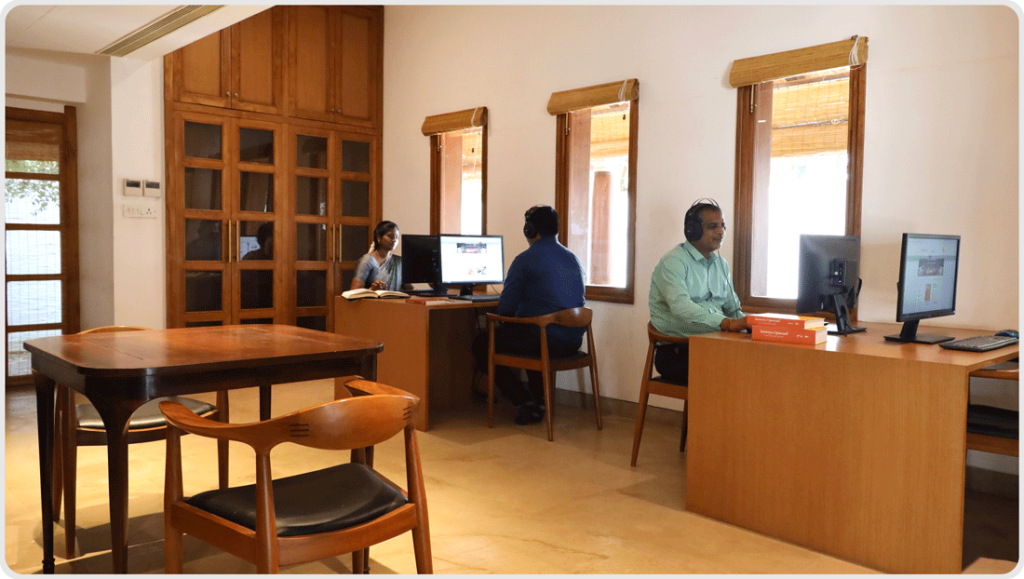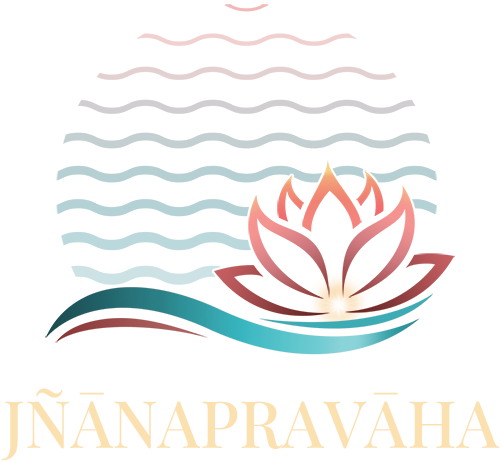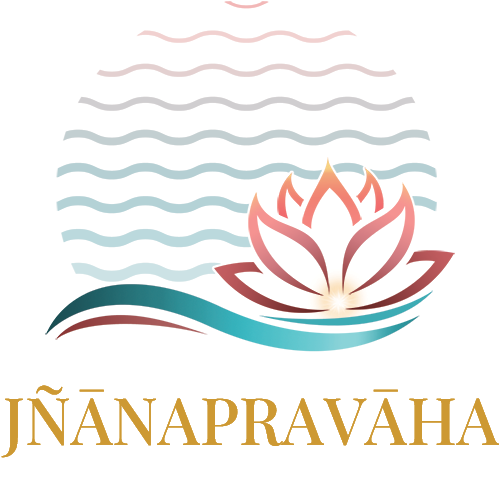
- Home
- »
- Facilities » Jnanapravaha Facilities
JÑĀNAPRAVĀHA – Facilities
JÑĀNAPRAVĀHA Facilities
A Guided Tour of Jnanapravaha
The Entrance to Jnanapravaha has been fashioned on the likeness of the old agraharam houses – complete with a thinnai (small raised platform used for sitting) and doorway.
Jnanapravaha is spread across an area of 3,106 sq.ft., the structure is built of teak wood and has been dressed with sandstone flooring. The use of traditional red oxide flooring and solid wooden pillars creates an effect of old-world charm.
Reading Room

The Reading Room has a collection of over 55 titles published by the Arsha Vidya Research & Publication Trust, ranging from general talks to more in depth scriptural texts. These books are transcribed from Pujya Swamiji’s talks and classroom teaching.
The Vedanta study neophyte as well as the more advanced Vedanta student both have the grand opportunity to delve into books according to their area of focus and capacity… and all in a calm, quiet space conducive to absorption in learning.
The collection of books also includes two extensive, beautifully written and presented biographies of Pujya Swami Dayananda Saraswati, providing a great avenue for readers to connect with, not just the Teachings, rather with the Teacher himself, by discovering and appreciating Pujya Swamiji through his life story and works.


Shrine & Meditation Hall
Shrine &
Meditation Hall

The Shrine is a part of the ‘Saraswati House’, the location of many satsangs, talks and bhajans, held by Pujya Swami Dayananda Saraswati on his visits to Manjakkudi.
This is a place conducive to meditation, contemplation, and excellent for one’s spiritual practises. Silence and stillness are distinctive of the Shrine, intermittently interspersed by melodious birdsong and the mentally-absorbing sounds of nature. One can effortlessly become lost in oneself for hours in this location!
A beautiful interconnection has been naturally drawn between the shrine at his birthplace, the janmabhumi of Pujya Swamiji at Manjakkudi and the Mahasamadhi adhishthanam at Rishikesh.
Bridging the two important locations of the Guruparampara, ten kilograms of sand from Saraswati House, Manjakkudi, were transported to the Mahasamadhi of Pujya Swamiji and consecrated stones from the Mahasamadhi were brought to the shrine at Saraswati House, energetically linking both places.
Daily puja is performed to these sacred stones at the shrine, invoking the presence of Pujya Swamiji and his Grace for the wellbeing and happiness of all.
The Retreat Space



At the heart of the landscaped gardens, we discover a stunningly designed contemporary structure, pure aesthetic pleasure to the eyes. It is here in the Retreat Space, the main building of Jnanapravaha, that Acaryas of the Arsha Vidya Parampara regularly conduct short and long-term retreats for their Vedanta students from all over the globe.
As we enter through the beautiful teak French casement doors, elegant wooden-paneled walls welcome us into the large interior learning space, which can seat around forty people for each session. The panels discretely disguise storage areas for audio-visual equipment etc, adding to the artistic simplicity of the layout.
Fully air-conditioned, the temperature can be regulated for the whole hall to suit all participants of the retreats. The hall also contains a lecture podium with microphone, overhead projector and screen, in-house Wi-Fi, and together with adjustable lighting, all facilities have been provided to ensure the Acaryas have access to every means of communication and presentation of the Teachings for their retreats.
The natural limestone flooring compliments the organic ambience of the Retreat Space, and the coffered ceiling assures excellent acoustics wherever one may be seated in the hall.
However, the tangible highlight of the room is seen to the right as we enter through the main doors – a true-to-life, black granite replica of Pujya Swamiji, beckons us with a sapient, subtle smile. This murti was sculpted by a reputed artiste from Mahabalipuram, who has sincerely, with ingenuity, captured the features and expression of revered Pujya Swamiji.
Study Centre


The study centre, situated next to the lecture hall, invites visitors and students to access Pujya Swamiji’s teachings through an application which is freely available on 4 PCs. It provides systematic, intuitive access to around 6,500 hours of audio and video recorded during six long-term courses of Pujya Swamiji.
In addition, all ebooks, audio- and video series that have been published in the ‘Teachings of Swami Dayananda’ app and Satsangs videos with Pujya Swamiji can be accessed freely.
Hard copies of the books by Pujya Swamiji are also available for reference, along with other original Vedantic Sanskrit texts, Sanskrit-English dictionaries, Vedanta reference books and more in the Reading Room.
Digital Archive
The Swami Dayananda Digital Archive in Manjakkudi stores more than 15 terabytes of digital content related to Pujya Swamiji’s books, images, talks and teachings in various digital formats.
The archive room is more than a digital library. Here, with the help of the study centre application, students of Pujya Swamiji can find his commentaries on works from over three decades, for a systematic comparative self-study on the different ways in which Pujya Swamiji has treated the same work or verses over the years.
Opening Time of Study Centre and Archive Room 9 AM to 7 PM

The Entrance to Jnanapravaha has been fashioned on the likeness of the old agraharam houses – complete with a thinnai (small raised platform used for sitting) and doorway.
Jnanapravaha is spread across an area of 3,106 sq.ft., the structure is built of teak wood and has been dressed with sandstone flooring. The use of traditional red oxide flooring and solid wooden pillars creates an effect of old-world charm.
Reading Room

The Reading Room has a collection of over 55 titles published by the Arsha Vidya Research & Publication Trust, ranging from general talks to more in depth scriptural texts. These books are transcribed from Pujya Swamiji’s talks and classroom teaching.
The Vedanta study neophyte as well as the more advanced Vedanta student both have the grand opportunity to delve into books according to their area of focus and capacity… and all in a calm, quiet space conducive to absorption in learning.
The collection of books also includes two extensive, beautifully written and presented biographies of Pujya Swami Dayananda Saraswati, providing a great avenue for readers to connect with, not just the Teachings, rather with the Teacher himself, by discovering and appreciating Pujya Swamiji through his life story and works.


Shrine & Meditation Hall
Shrine &
Meditation Hall

The Shrine is a part of the ‘Saraswati House’, the location of many satsangs, talks and bhajans, held by Pujya Swami Dayananda Saraswati on his visits to Manjakkudi.
This is a place conducive to meditation, contemplation, and excellent for one’s spiritual practises. Silence and stillness are distinctive of the Shrine, intermittently interspersed by melodious birdsong and the mentally-absorbing sounds of nature. One can effortlessly become lost in oneself for hours in this location!
A beautiful interconnection has been naturally drawn between the shrine at his birthplace, the janmabhumi of Pujya Swamiji at Manjakkudi and the Mahasamadhi adhishthanam at Rishikesh.
Bridging the two important locations of the Guruparampara, ten kilograms of sand from Saraswati House, Manjakkudi, were transported to the Mahasamadhi of Pujya Swamiji and consecrated stones from the Mahasamadhi were brought to the shrine at Saraswati House, energetically linking both places.
Daily puja is performed to these sacred stones at the shrine, invoking the presence of Pujya Swamiji and his Grace for the wellbeing and happiness of all.
The Retreat Space



At the heart of the landscaped gardens, we discover a stunningly designed contemporary structure, pure aesthetic pleasure to the eyes. It is here in the Retreat Space, the main building of Jnanapravaha, that Acaryas of the Arsha Vidya Parampara regularly conduct short and long-term retreats for their Vedanta students from all over the globe.
As we enter through the beautiful teak French casement doors, elegant wooden-paneled walls welcome us into the large interior learning space, which can seat around forty people for each session. The panels discretely disguise storage areas for audio-visual equipment etc, adding to the artistic simplicity of the layout.
Fully air-conditioned, the temperature can be regulated for the whole hall to suit all participants of the retreats. The hall also contains a lecture podium with microphone, overhead projector and screen, in-house Wi-Fi, and together with adjustable lighting, all facilities have been provided to ensure the Acaryas have access to every means of communication and presentation of the Teachings for their retreats.
The natural limestone flooring compliments the organic ambience of the Retreat Space, and the coffered ceiling assures excellent acoustics wherever one may be seated in the hall.
However, the tangible highlight of the room is seen to the right as we enter through the main doors – a true-to-life, black granite replica of Pujya Swamiji, beckons us with a sapient, subtle smile. This murti was sculpted by a reputed artiste from Mahabalipuram, who has sincerely, with ingenuity, captured the features and expression of revered Pujya Swamiji.
Study Centre


The study centre, situated next to the lecture hall, invites visitors and students to access Pujya Swamiji’s teachings through an application which is freely available on 4 PCs. It provides systematic, intuitive access to around 6,500 hours of audio and video recorded during six long-term courses of Pujya Swamiji.
In addition, all ebooks, audio- and video series that have been published in the ‘Teachings of Swami Dayananda’ app and Satsangs videos with Pujya Swamiji can be accessed freely.
Hard copies of the books by Pujya Swamiji are also available for reference, along with other original Vedantic Sanskrit texts, Sanskrit-English dictionaries, Vedanta reference books and more in the Reading Room.
Digital Archive
The Swami Dayananda Digital Archive in Manjakkudi stores more than 15 terabytes of digital content related to Pujya Swamiji’s books, images, talks and teachings in various digital formats.
The archive room is more than a digital library. Here, with the help of the study centre application, students of Pujya Swamiji can find his commentaries on works from over three decades, for a systematic comparative self-study on the different ways in which Pujya Swamiji has treated the same work or verses over the years.
Opening Time of Study Centre and Archive Room 9 AM to 7 PM


Read More








